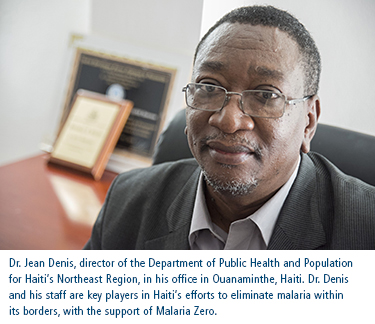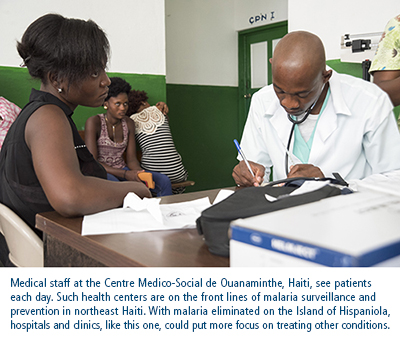You are here
Malaria Elimination to Inform Response to Other Disease Challenges
This post also appears on the new Malaria Zero website. Visit the site to learn more about the program and view a photo slideshow.
Located on the western half of the island of Hispaniola, Haiti is a Caribbean nation with a rich and storied history. As the poorest country in the Western Hemisphere, Haiti is also beset with a range of economic, development and public health challenges, and remains, along with neighboring Dominican Republic, the last stronghold of endemic malaria in the Caribbean.
 “Malaria is a responsibility we carry because it is an endemic disease in Haiti,” said Dr. Jean Denis, director of the Department of Public Health and Population for Haiti’s Northeast Region.
“Malaria is a responsibility we carry because it is an endemic disease in Haiti,” said Dr. Jean Denis, director of the Department of Public Health and Population for Haiti’s Northeast Region.
It is a burden Haiti’s already thin Ministry of Public Health and Population cannot afford. A 2010 earthquake on the island killed more than 220,000 people, displacing an additional 1.3 million people and devastating much of the country’s physical and health infrastructure. In the wake of the disaster, a cholera outbreak also erupted, killing more than 8,500 people and further taxing the nation’s public health resources.
In a country with poor infrastructure, mosquito breeding sites are abundant and can give rise to the various types of mosquitoes that spread lymphatic filariasis, Zika virus, chikungunya and malaria among the nation’s 10 million inhabitants. With 17,000 confirmed malaria cases in 2014, the added burden the parasite places on Haiti’s health system is substantial. Because of that, says Dr. Denis, eliminating malaria would have a significant effect on the country.
“If there was no malaria, money that was planned for treatment of malaria could be channeled elsewhere,” he said.
Post-earthquake public health enhancements
With the help of the international community, some of Haiti’s public health burden has been lessened following the earthquake in 2010. In the wake of the disaster, hundreds of millions of dollars flowed into the country, bolstering Haiti’s physical infrastructure and developing its public health capacity. Through the U.S. Centers for Disease Control and Prevention (CDC) and its partners, much of that support has focused on Haiti’s National Public Health Laboratory (LNSP), whose staff received training and equipment, as well as a new facility on site to support their work.
“The staff has become more and more professional,” said Dr. Jacques Boncy, director of the LNSP. “This is the case in all departments. From 2010 until today, the national lab has advanced to the next level.”
With additional training and resources, the lab can work with partners to tackle large-scale public health challenges, including malaria. In 2015, Malaria Zero was launched. Using an initial grant of $29.9 million from the Bill & Melinda Gates Foundation, the project seeks to eliminate malaria from Hispaniola by 2020. Through this effort, an alliance of partnering organizations will work with the departments of health in Haiti and the Dominican Republic to enhance their malaria programs. In the case of Haiti, a primary focus will be to bolster the country’s disease surveillance network, allowing trained local health care providers to quickly test for and treat the disease.
Eliminating malaria would boost other surveillance
For administrators like Dr. Boncy, the impact of malaria elimination would be profound. Though only a minority of tested cases of fever end up being positive for malaria, Dr. Boncy says a significant portion of national lab resources are taken up by the process of malaria diagnostic procedures.
 “Just in our parasitology department, we have 10 staff who work closely with the national malaria control program, and we also have 10 technicians in the field whom we supervise,” Dr. Boncy said, adding that such staff could over time be used elsewhere to also fight other common diseases.
“Just in our parasitology department, we have 10 staff who work closely with the national malaria control program, and we also have 10 technicians in the field whom we supervise,” Dr. Boncy said, adding that such staff could over time be used elsewhere to also fight other common diseases.
And while anti-malaria efforts drain critical resources from Haiti’s public health system, it has broader-reaching implications as well. Were it eliminated, Dr. Boncy says, it might contribute to a healthier workforce and improved productivity.
Dr. Boncy said, “It would have a serious economic impact as well, because of tourism.”
It is a sentiment heard often in Haiti’s public health sector. For Dr. Denis, malaria poses a threat not only to lives, but also to the country’s development. Further still, as long as Hispaniola remains the last stronghold of malaria in the Caribbean, its impact will be felt even beyond Haiti’s borders, including in the United States, which is located only 600 miles from the island nation.
“Eliminating malaria is very important because it impacts not only morbidity but also economics, because that money could be invested somewhere else,” Dr. Denis said. “And, Haiti is still a danger to reintroduce malaria to other countries in the region.”
Photos: © David Snyder/CDC Foundation
